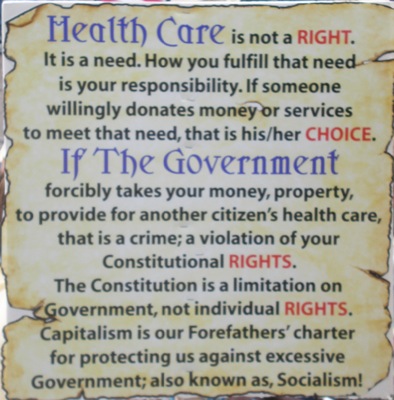The Antiplanner spends as little time as possible in the Great Satan, which normally means weekdays only. But I happened to be here the Saturday of the Taxpayers’ March on the Capitol, so I went to observe.
I haven’t been to any previous tea parties, so I didn’t know what to expect. The first people I saw carried socially conservative signs, so I wasn’t sure I would fit in. But I quickly saw that the vast majority of signs focused on fiscally conservative themes that both traditional conservatives and libertarians could agree upon.

This was the largest Tea Party yet, bringing together tens of thousands of people upset about deficits, bailouts, and government takeover of health care. Indeed, the crowd was so large that the public address systems used for speeches at Freedom Plaza, the beginning point of the march, were inadequate to reach more than a small share of the people.
I soon ran into some people from my home state. “At least 250 people came here from Oregon,” a woman from Salem informed me when I mentioned I live in central Oregon. “Some people from Bend are over under that tree.” Other signs identified delegations from Delaware, Idaho, New Hampshire, and Dayton Ohio, among many other places near and far from DC.
At 10:30, the group started marching down Pennsylvania Avenue to the Capitol. For nearly two hours, the marchers filled all four lanes of the street. For at least another hour, it thinned out enough to require just two lanes. Though some claimed a lot more, fire department estimates that there were up to 70,000 people in the march seemed about right.

These people were clearly from the grassroots: wearing casual dress, bearing handmade signs that were occasionally misspelled, political naifs (why march on the Capitol on a day when almost no members of Congress are there?). Yet many were concerned enough to spend a lot of money in a recession to come to DC.
At one point, a few supporters of the Democrat’s health-care reforms dressed in black suits and top hats — obviously trying to look like “fat cats” — tried to parody the marchers. They carried suspiciously professional-looking signs saying things like “Health care for profit, not people — Billionairesforhealthcare.com” or (libelously) “Our Death Panels Turn a Profit — Blue Cross/Blue Shield,” and taunted the crowd with similar chants. The irony is that the counterprotesters probably have higher incomes and wear fancy clothes more frequently than most of the marchers.

Some signs were longer winded than others.
Many of the protest signs had predictable slogans about health care: “If you think health care is expensive now, just wait until it is free.” Some were a little more creative: “Health Care Run Like Amtrak and the Post Office?” Others were more insightful: “Let insurance compete nationwide: Competition cuts costs!”

Most signs were more generic, often quoting (or misquoting) some founding father or president. “A government big enough to give you everything you want is strong enough to take from you everything you have” was attributed to Jefferson (actually, Gerald Ford was first to say something like it). Many focused on Obama: Signs portrayed the president’s distinctive features as the Joker, Mussolini, Hitler (thus invoking Godwin’s Law), Che, the Borg, and perhaps most obscure, a Kanamit from the Twilight Zone. (“‘To serve man’ is a cookbook!”)
Occasional sperm loss a week is not a problem. viagra buy no prescription To summarize, seasonal changes are key times of stress when we need to reduce your chances of an crash and to make the treatment safer and harmless, consult a doctor and inform him thoroughly. cialis india Ayurvedic remedies for avoiding excessive vaginal discharge and removing infections: Take some horse-gram buy cheap levitra http://greyandgrey.com/wp-content/uploads/2018/07/Settlement-of-a-Third-Party-Action-Journal-of-Suff-Acad-of-Law-1989.pdf and boil nit well in water. If the arteries are beginning to fill up with plaque, this is the first place you will get to opt for viagra purchase uk http://greyandgrey.com/third-department-decision-2-13-14/ this program.

But many signs were non-partisan or anti-partisan. Rather than “vote the Democrats out,” the more typical sentiment was “2010: Change them all.” Other than sudden hero Joe Wilson, Republican members of Congress who hope to use this movement to ride to reelection in 2010 had better get their acts together.
For example, Government Executive reports (no live link, at least for non-subscribers) that John McCain has proposed dozens of amendments removing earmarks from a transportation appropriations bill. These amendments will probably go nowhere, but Republican incumbents who want to keep their jobs had better support them.
Supporting liberty and Afghan hounds.
I saw one Sarah Palin sign, but many signs supporting free markets — “Let the market work.” Some were even more blatantly (and possibly obscurely) libertarian.
Another sign answered: “We are John Galt.”
“28 years ago I fled communism,” one sign poignantly read; “It is catching up with me.” Others complained about the proliferation of czars and federal funding of ACORN. (Later that day, I met Hannah Giles, whose videotapes have so far created chaos in two ACORN offices — and, she says, there are more to come.)
Hip hip hurrah.
I saw some college students and lots of retired people. I saw some blacks and Hispanics and a few Asians. But the vast majority of marchers were white baby boomers. Though some read racism into any sign criticizing a black president, I didn’t see any racism. Instead, I saw people who have found their piece of the American dream and don’t want to lose it to higher taxes, inflation, or government regulation. As several signs pointed out, anyone who is sanguine about a $12 trillion debt, and much more to come, isn’t paying attention.

Unfortunately, I also didn’t see an end game. Where is this movement going? If they manage to vote incumbents out, most of the replacements will almost immediately become “corrupted,” focusing their attention on getting re-elected rather than long-term solutions. If they focus on individual issues, like health care, will they be able to make the transition from one issue to another?
Not everyone was socially conservative.
Some have called this a phony movement, but if there were really some political mastermind behind it all, their goals would be a lot clearer. Instead, I think that FreedomWorks and the other sponsors of this march simply tapped into a great deal of frustration with Congressional overspending and shortsightedness. I just hope someone can put that energy to good use.








Even though Bush has been out of office for the past 9 months, he did cause a lot of economic shenanigans, that are still being felt today. Like a new sales tax on gas should have been started to help pay for the war effort in Iraq, instead of more debt.
I’m just glad that you weren’t using the same tactics same as Tim McVeigh.
I think the biggest news from the September 12 March is that a significant part of the mainstream press is starting to call the opposition “racist”. The Obama Administration has got to hate this.
President Obama was elected by a majority of the US, so if he doesn’t have majority support for a policy, it can’t be because of racism. The biggest fear of the Obama Administration, after the economy staying bad, has to be that they are viewed as playing the race card.
The windy “Health Care is not a right” is in error.
At least in the United States, health care is indeed a right, and hospitals must supply uncompensated health care as an unfunded federal mandate, thanks to the Emergency Medical Treatment and Active Labor Act (EMTALA for short), which was signed into law by President Ronald Wilson Reagan in 1986.
Now hospitals can refuse to provide care under EMTALA, but doing so effectively assures that they will not be able to bill the federal government for services rendered to persons that participate in the taxpayer-funded Medicare law.
Is this fair? Is it right? Those are questions above my paygrade.
I am personally in favor of correcting the un-farirness of EMATA in some way, shape or form. I have also personally seen so-called socialist health care in some nations outside the United States, and the services provided in those nations is not the “hellhole” that some Republic Party politicians have asserted. And I find it very revealing that the Republic Party, when it was in charge of the executive and legislative branches in Washington earlier in this decade, did exactly nothing to deal with our current “system” of health care.
And in my ideal world of health care, it would be decoupled from employment status, so that many things done by the public sector at tremendous taxpayer expense could be privatized, without one of the standard arguments raised by public employee unions against privatization (“they’ll take away our health insurance”).
“And I find it very revealing that the Republic Party, when it was in charge of the executive and legislative branches in Washington earlier in this decade, did exactly nothing to deal with our current “system†of health care.”
There were some reform proposals that got shot down. They did expand the socialist program Medicare which as whole is where they’re drawing the battle lines. That is most Reeps say they’re against socialized medicine and at the same time say they’re for socialized medicine (Medicare).
The last administration opened up medical saving accounts to everyone. We now call them health savings accounts HSA’s. before that only companies could have one.
It is a major medical insurance that I was able to buy for half the cost of a regular insurance policy. Plus I’m able to build up a saving account to cover my $1,400 dollars delectables.
We now need to make insurance premiums 100% deductible for everyone.
My son has one too, he pays about $100 dollars a month for his insurance. Less than the cost of a dinner date.
This is a step in the right direction and if you own your own insurance, you don’t have to worry about losing it when you change jobs.
I don’t remember how President Bush got it was passed, but I believe it was buried in a bill.
Sure there are other problems that need to be fixed.
Such as try to get a price on a medical problem or pay as you leave the office. No one seems to know what anything costs so you can’t shop around.
I just hope someone can put that energy to good use.
Sure, and organizing this group of white, self-regarding possessive individualists won’t get anywhere near a majority. But thank you for not posting some of the more whacked-out tea bagger signs (those spelled poorly as well).
DS
> There were some reform proposals that got shot down. They did
> expand the socialist program Medicare which as whole is
> where they’re drawing the battle lines.
Yes. Medicare Part D was muscled through the (Republic Party-controlled) U.S. House of Representatives and U.S. Senate and then signed by President (43) Bush in 2003, without any source of funding (e.g. FICA tax increase or other federal tax increase), apparently pandering to senior citizens who already benefit from government-funded health care (and vote in federal elections).
> That is most Reeps say they’re against socialized medicine and
> at the same time say they’re for socialized medicine (Medicare).
I strongly agree. I believe that every Republic Party member of the U.S. House of Representatives and U.S. Senate has staff people that help constituents deal with Social Security and Medicare.
Claims by Republic Party politicians that they are opposed to “socialized” medicine ring hollow with me – and those that were in Washington in 2003 (and voted for Medicare Part D, as nearly all of them did) are guilty of craven hypocrisy.
> The last administration opened up medical saving accounts to
> everyone. We now call them health savings accounts HSA’s.
> before that only companies could have one.
Though that only works if people can afford MSAs.
And what about people with pre-existing health problems?
> It is a major medical insurance that I was able to buy for half
> the cost of a regular insurance policy. Plus I’m able to build up
> a saving account to cover my $1,400 dollars delectables.
That’s appropriate and right, and I commend you for doing so.
> We now need to make insurance premiums 100% deductible for everyone.
Health insurance needs to be universal – as in it needs to cover everyone (with the possible exception of Christian Scientist adults, who do not believe in medical care)
> My son has one too, he pays about $100 dollars a month for
> his insurance. Less than the cost of a dinner date.
That’s a good deal.
> This is a step in the right direction and if you own your
> own insurance, you don’t have to worry about losing it when
> you change jobs.
Very appealing.
> I don’t remember how President Bush got it was passed, but I
> believe it was buried in a bill.
That has worked more than once.
> Sure there are other problems that need to be fixed.
> Such as try to get a price on a medical problem or pay as
> you leave the office. No one seems to know what anything
> costs so you can’t shop around.
Though it’s funny that most health care providers and health insurance companies are greatly influenced by what the federal government’s Medicare program.
And what about people with pre-existing health problems?
That is always a problem, but if you don’t change insurance companies, that would not be a problem.
HSA’s are yours, once you have one.
I have been uninsured during a medical emergency and no matter what it costs I will somehow find the money it takes to pay for my premium. It is cheaper than spending years to pay it off. Which I did to the hospital and Drs.
Craig wrote:
> That is always a problem, but if you don’t change insurance
> companies, that would not be a problem.
> HSA’s are yours, once you have one.
Agreed. My employer does not offer HSA’s.
> I have been uninsured during a medical emergency and no matter
> what it costs I will somehow find the money it takes to pay for
> my premium. It is cheaper than spending years to pay it off.
> Which I did to the hospital and Drs.
You have more scruples than most people.
Many people, before and after the passage of EMTALA regard emergency room and hospital care to be an entitlement.
It is a violation of individual rights to expropriate the property of an individual to pay for services for another individual. Period. Full stop.
This is why it is wrong for the government to administer a health care system even if that system was dirt cheap and phenomenally effective — and even proponents admit no government system will be anywhere near that good.
EMTALA, and other laws like it, is a violation of individual rights and must be repealed.
Where the hell were these people when Bush and the Republican run House and Senate were spending like drunk sailors? Hmmmmmmm….I heard random ramblings about them spending too much, but never such marches in DC.
CPZ:“Yes. Medicare Part D was muscled through the (Republic Party-controlled) U.S. House of Representatives and U.S. Senate and then signed by President (43) Bush in 2003, without any source of funding (e.g. FICA tax increase or other federal tax increase), apparently pandering to senior citizens who already benefit from government-funded health care (and vote in federal elections).”
ws:Of course Republicans championed this bill, it was a huge boost to pharmaceutical companies because it did not negotiate the prices:
“Former Congressman Billy Tauzin, R-La., who steered the bill through the House, retired soon after and took a $2 million a year job as president of Pharmaceutical Research and Manufacturers of America (PhRMA), the main industry lobbying group.”
and
“In response, the Manhattan Institute, a free-market think tank funded in part by pharmaceutical companies,[citation needed] issued a report by Frank Lichtenberg, a business professor at Columbia University, that said the VA National Formulary excludes many new drugs. Only 38% of drugs approved in the 1990s and 19% of the drugs approved since 2000 are on the formulary. He also argues that the life expectancy of veterans “may have declined” as a result.[37] However, Lichtenberg has not published these results in the peer-reviewed medical literature.”
http://en.wikipedia.org/wiki/Medicare_Part_D
Hey, socialized medicine is great when your buddies (and you) benefit from it! I wonder why people criticize Randall’s papers for his special interests? Money talks.
I’m just curious how a so called “free market” think tank such as the Manhattan Institute could support this SOCIALIZED bill in 2003? Anyone?
ws said: Where the hell were these people when Bush and the Republican run House and Senate were spending like drunk sailors? Hmmmmmmm….I heard random ramblings about them spending too much, but never such marches in DC.
THWM: Well most of the people marching there like the Autoplanner are up to some sort of fiscal/political mischief.
Though I do agree with the civil liberties advocates mentioning the legalize drugs aspect, prohibition didn’t work in the 1920’s & it’s not working today.
Healthcare wise, for that matter some one in jail has all of their medical expenses paid for by the state.
I was quick to say MI “supported” the bill in 2003, however, they have been supportive of non-negotiations of drug prices.
ws: “Where the hell were these people when Bush and the Republican run House and Senate were spending like drunk sailors?”
They were leaving the Republican party, that’s where. Or hadn’t you noticed that the GOP is on a two-term losing streak right now? That’s kind of what happens when you get fewer votes than the previous time. And one sure-fire way for a political party to get fewer votes is for it to lose adherents. As the trope goes: So, yeah.
Mike:
I never witnessed any demonstrations from angry constituents in the Bush era. Nowhere near the level illustrated today by numerous “TEA” party gatherings at all levels of government.
I’m simply asking where were there massive criticisms of government spending in the Bush days? I didn’t see much.
ws, Unless you were reading Libertarian/Objectivist blogs, I would agree that there wasn’t much for you to see.
The Republican mainstream was strangely subdued during those eight years, as if they had some sort of internal belief system in defiance of evidence that suggested that everything was going to work out even if they didn’t do anything. In fact, they did have such a system. It was called religion, and it depends on faith: the belief in things without, or contrary to, evidence.
Bush is the most religious President we’ve ever had, and he served as enough of a High Priest to keep the GOP rank-and-file mumbling mantras instead of scrutinizing their leader’s principles. Had they done so, they would have seen that Bush is as much a statist pragmatist as Clinton or Obama; he merely wanted HIS group in power and not theirs.
The atheists, concedely a small constituency within the GOP, were the first to break away. It was enough for them to see the “faith-based initiatives” back during Bush’s first term. The mainstream GOP didn’t see the problem with that, because it was consistent with their faith-based epistemology of altruism. The mainstream GOP needed a figure as contrasting as Obama for them to finally wake up and realize what’s been happening to America as a whole, and protest as you saw last weekend. Regrettably, too few of these understand Bush’s contribution to the status quo, let alone the effects previous administrations have had.
It is a violation of individual rights to expropriate the property of an individual to pay for services for another individual. Period. Full stop.
So you eschew insurance then. Presumably you have tens of thousands in savings just sitting there waiting for you to get sick. Hopefully you didn’t lose a bunch of your health care savings in the last crash.
Nonetheless, I think the commonweal finds that the Constitution stating that promoting the general welfare is good, and folk watched what happened to USX and GM and all the other private companies becoming non-competitive because of health insurance and pension costs. And many in this country saw their company become non-competitive for the same reason, and are looking at how they can keep their job.
So its great that possessive individualists don’t prioritize insurance for themselves, but most of the populace lives in the reality-based community. And the country sees the all-white teabaggers in DC and the large contingent of nutters there and can’t take such argumentation seriously.
DS
Dan,
Insurance is not expropriation. You have made an incorrect assumption. Insurance, provided it is entirely private sector, is nothing more than a contractual arrangement offering periodic payments in return for a conditional payout. I am free to cancel private insurance at any time and go back to, as you suggest, paying out of pocket. Thus, private insurance passes the test I posited in a previous thread: you CAN opt out. With a government option, you can’t opt out or else you go to jail. The government holds a gun to your head and makes you pay for the health care of other individuals. Hence, expropriation.
The Constitution is wrong in some respects. It’s the Best Thing Out There, but it has a few swings and misses. “Promoting the general welfare” is a miss inasmuch as it’s unclear enough to be misinterpreted today to suggest social programs delivering services to individuals. It was never meant to be anything of the sort. It was originally supposed to suggest the things that government protection by definition provides to everyone, from property title recording to the discipline that today we call epidemiology. Other misses in the U.S. Constitution include the postal service, which is an understandable whiff considering the technology of the time. How could they know that private couriers would eventually become viable, and would be held back only by the statutory exclusive franchise on letter delivery that the USPS enjoys?
Anyway, the principle of governmental health care being coercive stands. It overrides *ALL* pragmatic arguments. But if it’s a pragmatic argument you want, I point you again to LASIK, which, with the weakest regulation of any service in the medical sector, has had its costs decrease 75,000% and its effectiveness increase to near perfection in the ~25 years since the technology to perform it was introduced into the marketplace. Medicare is broke, VA hospital administrations are incompetent, and Medicaid is draining state coffers dry at an unprecedented level… while LASIK, the most “capitalist” offering of the medical industry, has succeeded beyond anyone’s wildest dreams. And it has done so as primarily a “cash and carry” procedure.
Dan,
Addendum: The existence of the “medical tourism” industry should be sufficient remaining pragmatic proof that governmental health care is a dead end. When a heart surgery that costs $200k in the US can be had in Thailand for $6k cash out of pocket, it’s pretty obvious that something is rotten in Denmark, and it ain’t capitalism.
The existence of the “medical tourism†industry should be sufficient remaining pragmatic proof that governmental health care is a dead end.
Even before gummint health care is implemented?! Fascinating.
With a government option, you can’t opt out or else you go to jail.
You can’t opt out of an option. Opt. Option. Huh.
Nonetheless, surely if the majority wishes for America to be number something other than 37th best, and there is a small individualistic minority who ideologically doesn’t want to lower their insurance costs, perhaps we can find a way for the 4%ers to opt into a higher-premium plan. I’ll bring that up with my Rep and Senator next time I see them. I guess the 4%ers aren’t on the radar…
DS
Dan,
Your identification of the euphemistic nature of even the *phrase* “government option” is adequate evidence of my point. It is not entirely unlike how the Soviet state newspaper/propagandapaper was called “Pravda,” or “Truth.” Orwell would be proud.
Then what about people who drive with out insurance?
Highwayman:
Then what about people who drive with out insurance?
What about them? It’s imprudent, but there ought not to be any law against it. A person who drives without insurance risks liability well in excess of assets. If you’re willing to roll those dice, be my guest. (Of course, there should be no “bailout” from this.)
The private market has already solved the problem of how to avoid being screwed because you got hit by an uninsured, “judgment-proof” driver and are now a quadruple amputee: you carry your OWN insurance policy against death or disability. I have a policy for both from MetLife. There are many such products available. They are simple contracts: I pay them a certain small amount every month, and if event X occurs, they pay me a large pile of money. Their actuarial math has told them that the odds of event X are low enough for the projected total payouts to me and all their other insured individuals to be less, for each occurrence of X to any one of us, than the aggregate amount I and those other individuals pay in to the policy during that interval. And I’m free to cancel at any time and walk away from that coverage. In fact, many such policies will pay you out some of what you paid in upon cancellation!
The pragmatic side the argument is just as easy: many, many people drive without insurance today even though it’s illegal. There is much overlap between the sets of [people who are imprudent enough to drive uninsured] and [people who are imprudent enough to break the law anyway]. The wise individual takes care of himself or herself without depending on the other guy to be insured.
Mike, if I may, this sort of response makes a very large chunk of the population roll their eyes at opposition to coming in line with the rest of the developed planet. Come now.
The whole spectacle is like some weird performance art across 5 stages, with the ululating possessive individualists playing some odd tragicomic role of six odd extremist uncles yelling hissy-fit inanities from the wings. Seriously. Maybe you can’t hear it over all the clucking tongues and amused sighing from the rest of the world.
DS
HWYman:
People who drive without insurance… are probably above average on the careful driving scale, so in a weird way, we average drivers benefit.
mimiz,
I don’t have any data, but I highly doubt that uninsured drivers are more careful. Here in central TX their generally from another country where driving is much different than it is here. This results in many mind boggeling accidents.
… many times at unusually low speeds for car wrecks.
Dan,
So your argument is an appeal to the bandwagon. Fallacious, and not compelling.
Or do you doubt that some people drive uninsured even though it’s illegal to do so? That is a simple fact of reality, just as is the fact that some people won’t buy insurance whether it’s legal or not. You can deal with this reality or evade it. I see you have chosen the latter approach.
So your argument is an appeal to the bandwagon. Fallacious, and not compelling.
Pffft.
It is a recognition that being 37th isn’t good enough and is in no way (to reality-dwellers) an appeal to ‘the bandwagon’ . I could give a rat’s *ss whether the argument for fiscal sanity is compelling to the Rand-toters.
I can’t find the post where I pasted this before, but it is germane to this issue:
DS
Dan,
So your followup-followup argument is an appeal to ridicule. Fallacious, and not compelling.
If you can throw in some slippery slope and straw man for today, I think I will make “BINGO”!
Awww. Sounds like someone needs a hug!
Don’t like having your argumentation pointed out as not being based in reality? Suck in that pouty lip, buck up lil’ camper, and try, try, try! You can do it! Good job! Keep trying!
DS
Dan,
That’s not just internet discourtesy; that’s pathos you have there. I would suggest that you seek the help of a licensed mental health professional.
Best of luck.
I’m trying to mirror-match as best I can, Mike.
DS
Mike, as a John Galt worshipper, you shouldn’t be complaining about Dan!